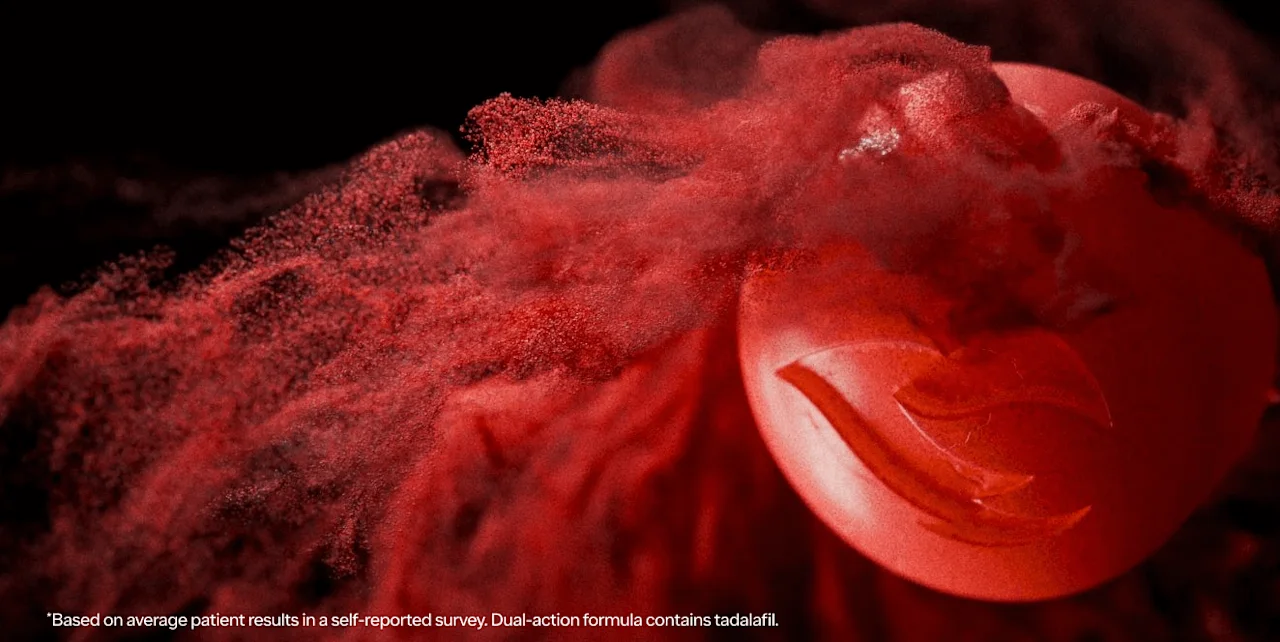Key takeaways
When it comes to horny goat weed vs. Viagra, only one is actually FDA-approved to treat erectile dysfunction (ED): Viagra.
Research suggests horny goat weed may work similarly to Viagra, but it’s about 80 times less potent and has not been proven effective in humans.
Viagra is a well-studied, fast-acting, and safe treatment for ED, while horny goat weed is an unproven, unregulated option with unknown long-term safety.
Here's what we'll cover
Here's what we'll cover
Here's what we'll cover
Key takeaways
When it comes to horny goat weed vs. Viagra, only one is actually FDA-approved to treat erectile dysfunction (ED): Viagra.
Research suggests horny goat weed may work similarly to Viagra, but it’s about 80 times less potent and has not been proven effective in humans.
Viagra is a well-studied, fast-acting, and safe treatment for ED, while horny goat weed is an unproven, unregulated option with unknown long-term safety.
When it comes to treating erectile dysfunction (ED), few names are as recognizable as Viagra (sildenafil). The “little blue pill” is a go-to solution for millions of men. But there’s a growing interest in natural alternatives like horny goat weed. And with it the question, “Which is better at treating ED: horny goat weed vs. Viagra?”
The long and short of it is this: Currently, the research on horny goat weed for ED in humans is seriously lacking. Meanwhile, Viagra has decades of research proving its safety and efficacy.
Still, you may want to know why some tout horny goat weed as a possible treatment for ED and how it compares to Viagra. Read on as we break it all down.
Horny goat weed vs. Viagra
Let’s start with the basics. Here’s what you need to know about horny goat weed vs. Viagra.
What they are: Viagra (sildenafil) is a prescription medication that treats ED. It’s part of a class of drugs called phosphodiesterase 5 (PDE5) inhibitors. Horny goat weed is a common name for the Epimedium plant. It has been used in traditional Chinese medicine to treat sexual issues, including ED.
How they work: Viagra blocks an enzyme called PDE5, which is responsible for breaking down an erection. By inhibiting PDE5, the drug increases blood flow to the penis. Icariin, a compound in horny goat weed, is thought to work in the same manner.
What the science says: Viagra has decades of clinical research proving its effectiveness and safety in treating men with ED. The US Food and Drug Administration (FDA) first approved it for ED back in 1998. Horny goat weed, on the other hand, has limited evidence — most of which is in animal studies. Plus, as a supplement, it doesn’t undergo the same FDA review for safety or effectiveness.
| Viagra | Horny goat weed |
|---|---|---|
What is it? | Prescription medication FDA-approved to treat ED | Over-the-counter herbal supplement |
Effectiveness | Improves erections for up to 82% of men | Erectile improvement in rats; unknown in humans |
Side effects | Headache, flushing, indigestion, abnormal vision, nasal congestion, back or muscle pain, nausea, dizziness, rash | Nausea, stomach upset, allergic reactions (including rash and dermatitis) |
Dosage | 25 mg, 50 mg, or 100 mg taken 30–60 minutes before sex | Varies; 250 mg–500 mg, once daily |
FDA approval | Yes | No |
How long it lasts | Up to four hours | Unknown |
How does Viagra work?
Viagra (sildenafil) is a type of medication known as a PDE5 inhibitor. As this name suggests, Viagra inhibits or blocks an enzyme known as PDE5.
Here’s why that matters:
When you’re sexually aroused, your body releases nitric oxide, which triggers the production of a chemical messenger called cyclic GMP (cGMP).
cGMP relaxes the smooth muscle tissue in the penis. This allows the blood vessels to widen and fill with blood, creating an erection.
After your erection, PDE5 breaks down cGMP so your penis can return to its flaccid state.
By inhibiting PDE5, Viagra boosts blood flow to the penis, making it easier to get and maintain an erection when sexually stimulated.
Viagra typically works within 30-60 minutes after you take it and lasts up to four hours.
How does horny goat weed work?
Horny goat weed (also referred to as yang huo) comes from the Epimedium plant. It is available in tablet and capsule forms, which are typically taken once a day.
Horny goat weed has been used in traditional Chinese medicine to treat ED for centuries. That’s because its main active compound, icariin, has been shown to have a mild PDE5-inhibiting effect in in vitro studies of human cells. By blocking PDE5, icariin may improve blood flow to the penis like Viagra.
You may have noticed that we called icariin’s PDE5-inhibiting effect mild. How mild? We’re so glad you asked. One study estimated that icariin is about 80 times less potent than sildenafil, the active ingredient in Viagra.
And because icariin’s possible benefits for ED have primarily been studied in animals, it’s hard to tell whether it would have the same effect in humans. Simply put, more research is needed.
Horny goat weed benefits
Horny goat weed has long been used in traditional Chinese medicine to treat a variety of ailments, including sexual dysfunction. But there’s limited human research to support its effectiveness for these uses.
Most, if not all, of the research on horny goat weed has been done on animals or on human cells in labs. And according to these studies, icariin — a compound found in the herb — is largely responsible for any potential perks.
Based on the current (non-human) research, horny goat weed may benefit:
Erectile dysfunction: Lab and animal studies suggest icariin may improve erectile function by increasing blood flow to the penis.
Cardiovascular health: Some lab and animal studies suggest icariin has antioxidant properties that may help with blood vessel health and prevent atherosclerosis (hardening of the arteries).
Diabetes: Molecular research suggests icariin may be useful in both preventing and treating diabetes and related complications, including diabetes-related ED.
It’s important to remember that the majority of research on horny goat weed has been done in labs and on animals. So, their findings — including the supposed benefits listed above — may not translate to humans.
Horny goat weed effects in humans
When it comes to the effects of horny goat weed on humans, the research is sparse.
However, there are a few studies worth calling out:
A 2007 small study of 100 postmenopausal women found that some extracts of the Epimedium plant — including icariin — may help prevent bone loss.
A 2012 clinical trial of 63 men with mild to moderate ED found that a supplement containing horny goat weed (and 12 other herbs) improved ED. But it’s unclear whether the benefit came from horny goat weed itself or another ingredient in the herbal blend.
That’s about it when it comes to research on horny goat weed in humans. The fact that the existing research is so limited doesn’t necessarily mean that horny goat weed couldn’t have potential therapeutic benefits, including for ED, in humans. But we need more research — a lot more research — before we can draw those conclusions.
Horny goat weed vs. Viagra: does horny goat weed really work for ED?
Currently, there isn’t enough evidence in humans that horny goat weed works for ED.
So, if you’re wondering if you can start calling horny goat weed “herbal Viagra?” The answer is probably not.
Here’s the deal: Viagra is an extensively studied, proven, and fast-working treatment for ED. It’s a standard first-line treatment for ED for a reason: When taken as directed, Viagra typically works (and is safe) for most men with ED.
Animal studies suggest horny goat weed may have a similar mechanism to Viagra. But it is likely far less potent and currently unproven in humans.
That doesn’t mean horny goat weed is useless for ED. It’s possible that some men may experience benefits, especially if their ED is mild. But horny goat weed should not be considered a substitute for proven ED treatment like Viagra.
Research on horny goat weed for erectile dysfunction
The research on horny goat weed for erectile dysfunction is quite limited.
In the 2012 clinical trial mentioned above, 63 men with mild to moderate ED saw an improvement in their condition after taking a supplement containing horny goat weed. The supplement also included 12 other ingredients. So, it’s impossible to know what caused the ED benefit: horny goat weed, another ingredient, or a combination of ingredients.
Beyond that, the research on horny goat weed for ED is mostly done on or with animals.
Animal research from 2005, 2010, and 2017 found that taking icariin for 4–5 weeks improved erectile function in castrated rats and rats with nerve injury.
A scientific review suggests that icariin may help prevent atherosclerosis in mice and rats. Atherosclerosis is a condition characterized by a buildup of plaque in the arteries. It’s a major risk factor for ED. Since the arteries in the penis and the heart are similarly small, people may develop ED years before they get diagnosed with heart disease.
As for how well those results translate to humans, it’s too early to tell. We need more clinical trials of horny goat weed treating human men with ED.
Side effects of horny goat weed
According to the limited human studies available, common side effects of horny goat weed seem to include:
Nausea
Abdominal discomfort or stomach upset
Skin rash and allergic dermatitis
However, research on sexual supplements containing horny goat weed or icariin (its active ingredient) reveals a longer list of potential side effects, such as:
Fever
Increased heart rate
Aggressivness
Agitation, irritability, or nervousness
Dizziness
Vomiting
Hives
Facial flushing
Insomnia
Internal bleeding
That being said, the current (limited) research suggests horny goat weed is generally well-tolerated in people. Still, it’s also worth noting that there have been reports of cardiovascular and liver issues among those using horny goat weed supplements.
Some people have experienced liver problems after taking supplements that contain horny goat weed. But it’s unclear whether they can be attributed to the horny goat weed or to other ingredients in the product.
Some men with heart problems have reported new symptoms, including increased heart rate and irritability, after taking supplements containing horny goat weed.
Bottom line: Because there is so little research on horny goat weed use in humans and because horny goat weed is not regulated by the FDA, we just don’t know the full scope of the herb’s side effects. The same can be said of horny goat weed’s potential risks and interactions. And on that note…
Horny goat weed drug interactions
Horny goat weed may interact with other medications and supplements, including:
Blood thinners or antiplatelet drugs
Blood pressure (BP) medications
Other medications metabolized by the liver (e.g. CYP inhibitors)
Animal studies show that horny goat weed can interact with medications that are metabolized by the liver, including CYP inhibitors like Viagra and sildenafil. Taking horny goat weed at the same time as these drugs may cause unwanted side effects or disrupt how well those medications work.
Horny goat weed may interact with anticoagulant and antiplatelet medications, given its anti-inflammatory and antiplatelet properties. In other words, taking horny goat weed alongside these blood-clot-preventing treatments can increase the risk of bruising or bleeding.
And finally, horny goat weed may also interact with medications and supplements that lower blood pressure. It can cause a potentially dangerous dip in BP.
As with any type of treatment, it’s important to tell your healthcare provider about any supplements or prescription medications currently in your regimen. Doing so can help your provider determine whether taking horny goat weed may be safe.
How fast does horny goat weed work?
Given the lack of clinical trials, we don’t know how fast horny goat weed works or how long it stays in your system.
Research hasn’t established an onset time, dosage, or duration of effect in humans. For what it’s worth, studies of rats show that taking horny goat weed for 4–5 weeks can lead to improved erections.
Most horny goat supplements recommend daily use, and the effects are said to “build up” over time. When marketers aren’t being vague, the time frame may range from 4–8 weeks.
Viagra, on the other hand, is proven to work within 30–60 minutes of taking it, and lasts for four hours afterward.
Other treatments for erectile dysfunction
For now, the research on horny goat weed in humans is limited. But there are plenty of well-studied, currently available treatments for ED.
First up: PDE5 inhibitors. These medications are often considered the first-line treatment for ED thanks to their high effectiveness and safety among patients.
Sildenafil (Viagra) starts working within 30–60 minutes of taking and lasts up to four hours.
Tadalafil (Cialis) can start working within 30–60 minutes of taking and lasts up to 36 hours. Lower-strength tadalafil and brand-name Cialis can also be used daily, allowing for increased spontaneity.
Vardenafil is similar to Viagra in that it starts working within 30–60 minutes of taking, but it can last a bit longer — up to five hours.
Avanafil (Stendra) has the fastest onset of the four PDE5 inhibitors, kicking in within 30–45 minutes of taking. It lasts up to 10 hours.
Certain PDE5 inhibitors can also be found in other formulations, such as lozenges and gummies. Options include:
Ro Sparks, which is a sublingual treatment that combines tadalafil and sildenafil. It dissolves under your tongue for fast-acting, long-lasting effects. (It kicks in in just 15 minutes and continues to work for up to 36 hours.)
Daily Rise Gummies, which are fruit-flavored gummies containing tadalafil. They’re designed to be taken once a day, so you’re ready to go whenever the mood strikes.
Beyond prescription medications, there are also options for treating ED naturally. These include:
Exercising regularly (and losing weight if you have obesity or overweight)
Eating a healthy, balanced diet like the Mediterranean diet
Getting ample sleep
Reducing stress and taking care of your mental health
Limiting or quitting alcohol
Treating underlying conditions that are contributing to your ED, such as diabetes
Finally, there are also physical devices that can help with ED, such as penis pumps, or surgical options like penis implants.
Bottom line
Horny goat weed may just be perfectly named for use as an ED supplement. It’s too bad there’s limited evidence to support it. And when compared to Viagra, it just does not stack up. Here’s what to know about horny goat weed vs. Viagra:
Viagra is an FDA-approved medication that’s clinically proven to be safe and effective for treating erectile dysfunction. Horny goat weed lacks scientific evidence and is unregulated.
Animal studies suggest horny goat weed may work similarly to Viagra by boosting blood flow to the penis. But there’s just not enough research on humans to back this up.
Viagra, along with other PDE5 inhibitors like Cialis (tadalafil), remains the gold-standard treatment for ED. That’s because they can be highly effective, fast-acting, and well-tolerated.
Besides traditional PDE5 inhibitors, there are plenty of treatment options for ED. They range from gummies and lozenges (e.g. Ro Sparks, Daily Rise Gummies) to lifestyle changes and medical interventions.
Frequently asked questions (FAQs)
What herb is equal to Viagra?
No herb has been proven to be equal to Viagra in terms of safety and effectiveness. Some — like horny goat weed, red ginseng, and ginkgo biloba — have shown mild PDE5-inhibiting effects in animal research. But none of these herbs are clinically equivalent.
Is there anything that works better than Viagra?
Some men respond better to other PDE5 inhibitors, such as Cialis (tadalafil), which lasts longer (up to 36 hours). But in terms of overall effectiveness, Viagra and similar FDA-approved medications remain the best-studied options. It’s usually about finding the PDE5 inhibitor that works best for you.
Can I take both Viagra and horny goat weed?
No, you should not take Viagra and horny goat weed together. Both affect PDE5 and may interact in unpredictable ways, potentially causing side effects or interfering with their ability to improve your erections.
How long does it take Viagra to work?
Viagra usually starts working in 30–60 minutes, although you need to be sexually aroused in order for it to work. If Viagra isn’t working for you, contact your healthcare provider to discuss other treatment options.
How long does it take horny goat weed to work?
We don’t know how long it takes horny goat weed to work because the current research hasn’t yet shown whether it reliably improves ED symptoms in humans.
DISCLAIMER
If you have any medical questions or concerns, please talk to your healthcare provider. The articles on Health Guide are underpinned by peer-reviewed research and information drawn from medical societies and governmental agencies. However, they are not a substitute for professional medical advice, diagnosis, or treatment.
Viagra Important Safety Information: Read more about serious warnings and safety info.
Cialis Important Safety Information: Read more about serious warnings and safety info.
References
Argiolas, A., Argiolas, F. M., Argiolas, G., et al. (2023). Erectile dysfunction: Treatments, advances and new therapeutic strategies. Brain Sciences, 13(5), 802. doi: 10.3390/brainsci13050802. Retrieved from https://pmc.ncbi.nlm.nih.gov/articles/PMC10216368/
Cao, Y-F., He, R-R., Cao, J., et al. (2012). Drug-Drug Interactions Potential of Icariin and Its Intestinal Metabolites via Inhibition of Intestinal UDP-Glucuronosyltransferases. Evidence-Based Complementary and Alternative Medicine, 2012, 395912. doi: 10.1155/2012/395912. Retrieved from https://pmc.ncbi.nlm.nih.gov/articles/PMC3479967/
Corazza, O., Martinotti, G., Santacroce, R., et al. (2014). Sexual Enhancement Products for Sale Online: Raising Awareness of the Psychoactive Effects of Yohimbine, Maca, Horny Goat Weed, and Ginkgo biloba. BioMed Research International, 2014, 841798. doi: 10.1155/2014/841798. Retrieved from https://pmc.ncbi.nlm.nih.gov/articles/PMC4082836/
Dell’Agli, M., Galli, G. V., Cero, E. D., et al. (2008). Potent inhibition of human phosphodiesterase-5 by icariin derivatives. Journal of Natural Products, 71(9), 1513–1517. doi: 10.1021/np800049y. Retrieved from https://pubmed.ncbi.nlm.nih.gov/18778098/
Dhaliwal, A. & Gupta, M. (2023). PDE5 inhibitors. StatPearls. Retrieved from https://www.ncbi.nlm.nih.gov/books/NBK549843/
Fang, J., & Zhang, Y. (2017). Icariin, an Anti-atherosclerotic Drug from Chinese Medicinal Herb Horny Goat Weed. Frontiers in Pharmacology, 8. doi: 10.3389/fphar.2017.00734. Retrieved from https://pmc.ncbi.nlm.nih.gov/articles/PMC5644024/
Ganapathy, A. A., Priya, V. H., & Kumaran, A. (2020). Medicinal plants as a potential source of Phosphodiesterase-5 inhibitors: A review. Journal of Ethnopharmacology, 267, 113536. doi: 10.1016/j.jep.2020.113536. Retrieved from https://www.sciencedirect.com/science/article/abs/pii/S0378874120334243?via%3Dihub
Hsueh, T., Wu, Y., Lin, L., et al. (2013). Herb-Drug Interaction of Epimedium sagittatum (Sieb. et Zucc.) Maxim Extract on the Pharmacokinetics of Sildenafil in Rats. Molecules, 18(6), 7323–7335. doi: 10.3390/molecules18067323. Retrieved from https://pmc.ncbi.nlm.nih.gov/articles/PMC6270200/
Irfan, M., Kwon, T., Lee, D., et al. (2021). Antiplatelet and Antithrombotic Effects of Epimedium koreanum Nakai. Evidence-based Complementary and Alternative Medicine, 2021, 1–11. doi: 10.1155/2021/7071987. Retrieved from https://pmc.ncbi.nlm.nih.gov/articles/PMC8068545/
Jiang, W., Ding, K., Yue, R., et al. (2023). Therapeutic effects of icariin and icariside II on diabetes mellitus and its complications. Critical Reviews in Food Science and Nutrition, 64(17), 5852–5877. doi: 10.1080/10408398.2022.2159317. Retrieved from https://pubmed.ncbi.nlm.nih.gov/36591787/
Lee, H. W., Lee, M. S., Kim, T., et al. (2021). Ginseng for erectile dysfunction. The Cochrane Database of Systematic Reviews, 4(4), CD012654. doi: 10.1002/14651858.cd012654.pub2. Retrieved from https://pmc.ncbi.nlm.nih.gov/articles/PMC8094213/
Leslie, S. W. & Sooriyamoorthy, T. (2024). Erectile Dysfunction. StatPearls. Retrieved from https://www.ncbi.nlm.nih.gov/books/NBK562253/
Liu, W., Xin, Z., Xin, H., et al. (2005). Effects of icariin on erectile function and expression of nitric oxide synthase isoforms in castrated rats. Asian Journal of Andrology, 7(4), 381–388. doi: 10.1111/j.1745-7262.2005.00066.x. Retrieved from https://pubmed.ncbi.nlm.nih.gov/16281085/
National Institute of Diabetes and Digestive and Kidney Diseases. (2022). Horny goat weed. LiverTox: Clinical and Research Information on Drug-Induced Liver Injury. Retrieved from https://www.ncbi.nlm.nih.gov/books/NBK583203/
Punyawudho, B., Puttilerpong, C., Wirotsaengthong, S., et al. (2012). A randomized, Double-Blind, Placebo-Controlled crossover study of CAPPRA® for the treatment of mild or mild to moderate erectile dysfunction in Thai male. African Journal of Traditional, Complementary, and Alternative Medicines, 10(2), 310–315. Retrieved from https://pmc.ncbi.nlm.nih.gov/articles/PMC3746578/
Shindel, A. W., Xin, Z., Lin, G., et al. (2010). Erectogenic and neurotrophic effects of icariin, a purified extract of horny goat weed (Epimediumspp.) in vitro and in vivo. The Journal of Sexual Medicine, 7(4_Part_1), 1518–1528. doi: 10.1111/j.1743-6109.2009.01699.x. Retrieved from https://pmc.ncbi.nlm.nih.gov/articles/PMC3551978/
U.S. Food And Drug Administration (FDA). (2022). FDA 101: Dietary Supplements. Retrieved from https://www.fda.gov/consumers/consumer-updates/fda-101-dietary-supplements
U.S. Food And Drug Administration (FDA). (2017). Highlights of Prescribing Information: Sildenafil tablets, for oral use. Retrieved from https://nctr-crs.fda.gov/fdalabel/services/spl/set-ids/878b4c44-cddc-42cb-b9b5-911451ad1530/spl-doc
Xu, Y., Xin, H., Wu, Y., et al. (2017). Effect of icariin in combination with daily sildenafil on penile atrophy and erectile dysfunction in a rat model of bilateral cavernous nerves injury. Andrology, 5(3), 598–605. doi: 10.1111/andr.12341. Retrieved from https://onlinelibrary.wiley.com/doi/10.1111/andr.12341
Yong, E. L., Wong, S. P., Shen, P., et al. (2007). Standardization and Evaluation of Botanical Mixtures: Lessons from a Traditional Chinese Herb, Epimedium, with Oestrogenic Properties. Novartis Foundation Symposium, 173–191. doi: 10.1002/9780470319444.ch12. Retrieved from https://onlinelibrary.wiley.com/doi/10.1002/9780470319444.ch12
Yuan, J., Zhang, R., Yang, Z., et al. (2013). Comparative effectiveness and safety of oral phosphodiesterase type 5 inhibitors for erectile dysfunction: a systematic review and network meta-analysis. European Urology, 63(5), 902-912. doi: 10.1016/j.eururo.2013.01.012. Retrieved from https://pubmed.ncbi.nlm.nih.gov/23395275/
Zhang, G., Qin, L., & Shi, Y. (2007). Epimedium-derived phytoestrogen flavonoids exert beneficial effect on preventing bone loss in late postmenopausal women: a 24-month randomized, double-blind and placebo-controlled trial. Journal of Bone and Mineral Research, 22(7), 1072–1079. https://doi.org/10.1359/jbmr.070405. Retrieved from https://onlinelibrary.wiley.com/doi/10.1359/jbmr.070405













